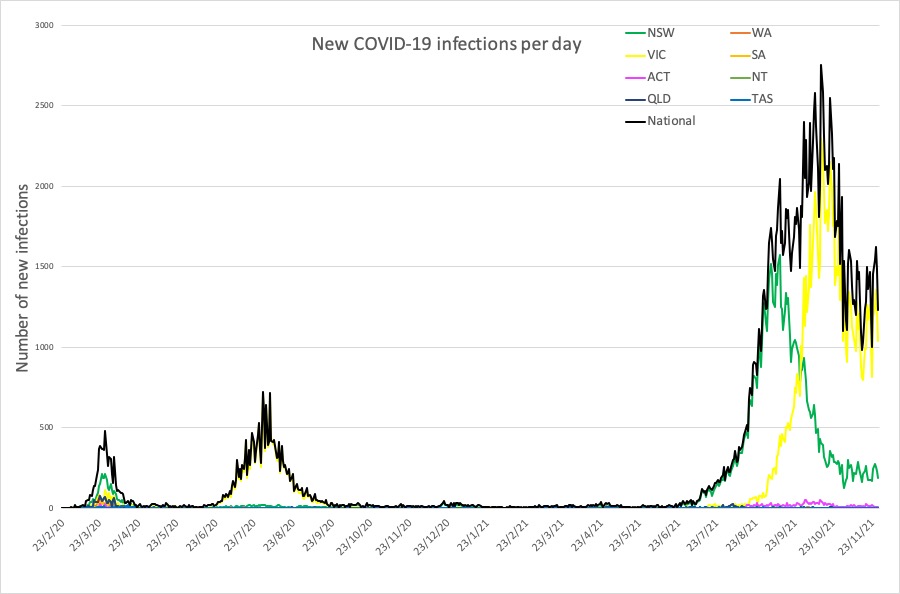And Australia's vaccine advisory group to examine booster intervals as Omicron emerges.
Welcome to The Medical Republic’s Covid Catch-Up.
It’s the latest covid-19 news in one convenient post. Email bianca@biancanogrady.com with tips, comments or suggestions.
29 November
- Risk of breakthrough infection three times higher at six months after second dose of vaccine.
- ATAGI to examine booster intervals in light of Omicron threat.
- Vaccines have saved at least half a million lives in Europe.
- Latest covid infection numbers from around Australia.
Six months after a second vaccine dose, the risk of breakthrough infection is already nearly three times greater than in people who have had their second dose less than 90 days prior.
A study published in the BMJ reports the incidence of covid among more than 83,000 individuals who had received two doses of Pfizer vaccine – but no booster – and had no previous history of covid infection.
Overall, 9.6% of the study population tested positive for covid three weeks or more after receiving their second dose of vaccine. When matched for other factors such as age and ethnicity, researchers found that the risk of infection increased with time since the second dose.
Those who received their second dose 150 days or more prior had a 2.8-fold greater risk of infection compared to those vaccinated less than 90 days prior. Even those vaccinated 90-119 days prior had a 2.3-fold greater risk of infection.
Australia’s vaccine advisory group will be taking a close look at the data on Omicron in coming days to determine whether there are any implications for Australia’s vaccination program, including the speed with which boosters are rolled out.
Speaking at a press conference today, federal Health Minister Greg Hunt said he had directed the Australian Technical Advisory Group on Immunisation to review the time-frame for booster doses – currently six months after the second vaccine dose – in light of the new variant of concern emerging.
“The early advice is there’s no signs that there is any breach to the integrity of the vaccine program,” Hunt said.
Meanwhile, Australia has closed its borders to non-residents or non-citizens travelling from nine African nations including South Africa, Namibia, Zimbabwe and Botswana over concerns about the spread of the Omicron variant.
Residents and immediately family are allowed to come into Australia but have to go into 14 days of supervised – hotel – quarantine, and anyone who has arrived in Australia in the last two weeks having visited these locations must report for quarantine for what’s left of those 14 days since departing southern Africa.
Covid vaccines have saved nearly half a million lives in those aged over 60 years in Europe, according to the European Centre for Disease Prevention and Control.
More than 90% of the 1.5 millions deaths from covid reported so far in the European region have been in people aged over 60, the ECDC said in a statement.
In a paper published in Eurosurveillance, researchers estimated that the introduction of covid vaccine had avoided 470,000 deaths in that age group across 33 countries. That figure didn’t include avoid deaths in younger people, nor deaths avoided because of reduced transmission among the vaccinated.
The number of avoided deaths were higher among countries that had earlier and more rapid uptake of vaccines.
Here are the latest covid infection numbers from around Australia to 9pm Sunday:
National – 207,982 with 1994 deaths
ACT – 2117 (7)
NSW – 81,355 (185)
NT – 284 (2)
QLD – 2120 (3)
SA – 931 (0)
TAS – 239 (0)
VIC – 119,815 (1038)
WA – 1121 (0)



